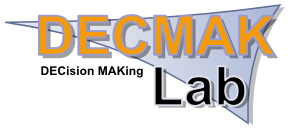DECMAK is a laboratory focused on the study of decision making.
Decision Making (DM) is the process leading to the selection of a course of action among alternatives. Every DM process produces a final choice. It can be an action, an opinion, etc. Group Decision Making (GDM) is a DM process in which a group, generally experts, look to get a common solution from an alternatives set.
The linguistic approach is an approximate technique which represents qualitative aspects as linguistic values by means of linguistic variables, that is, variables whose values are not numbers but words or sentences in a natural or artificial language. Since words are less precise than numbers, the concept of a linguistic variable serves the purpose of providing a measure of an approximate characterization of the phenomena which are too complex or ill-defined to be amenable to their description by conventional quantitative terms.
We are developing different approaches for GDM problems under linguistic information:
Linguistic selection models in GDM.
Consensus models under linguistic preference relations.
Choice functions for linguistic preference relations.
Linguistic aggregation operators: LOWA, LWA, ...
Aggregation of mutigranular information in GDM.
Combination of linguistic and numerical information in GDM.
A New linguistic representation model: The 2-tuple fuzzy linguistic representation model.
Additionallity, we consider multiperson/multicriteria decision making (MCDM) problems where, for each purpose (expert or criterion), the information about the alternatives can be supplied in different ways: an utility function, a preference ordering of alternatives, a fuzzy preference relation or a multiplicative preference relation.
We use the fuzzy preference relations as the base in our study, for the integration/transformation of preference structures, making different studies about them (consistency, reciprocity, missing values, ...).
Our group is developing different studies that include:
The integration of different preference structures in Multiperson Decision Making.
A consensus model for Multiperson Decision Making with different preference structures.
Some issues on consistency of fuzzy preference relations.
The proposal of different aggregation operators in Group Decision Making: OWG Operators, different IOWA and IOWG operators, ...
The use of Preference Relations with missing values in Group Decision Making.


